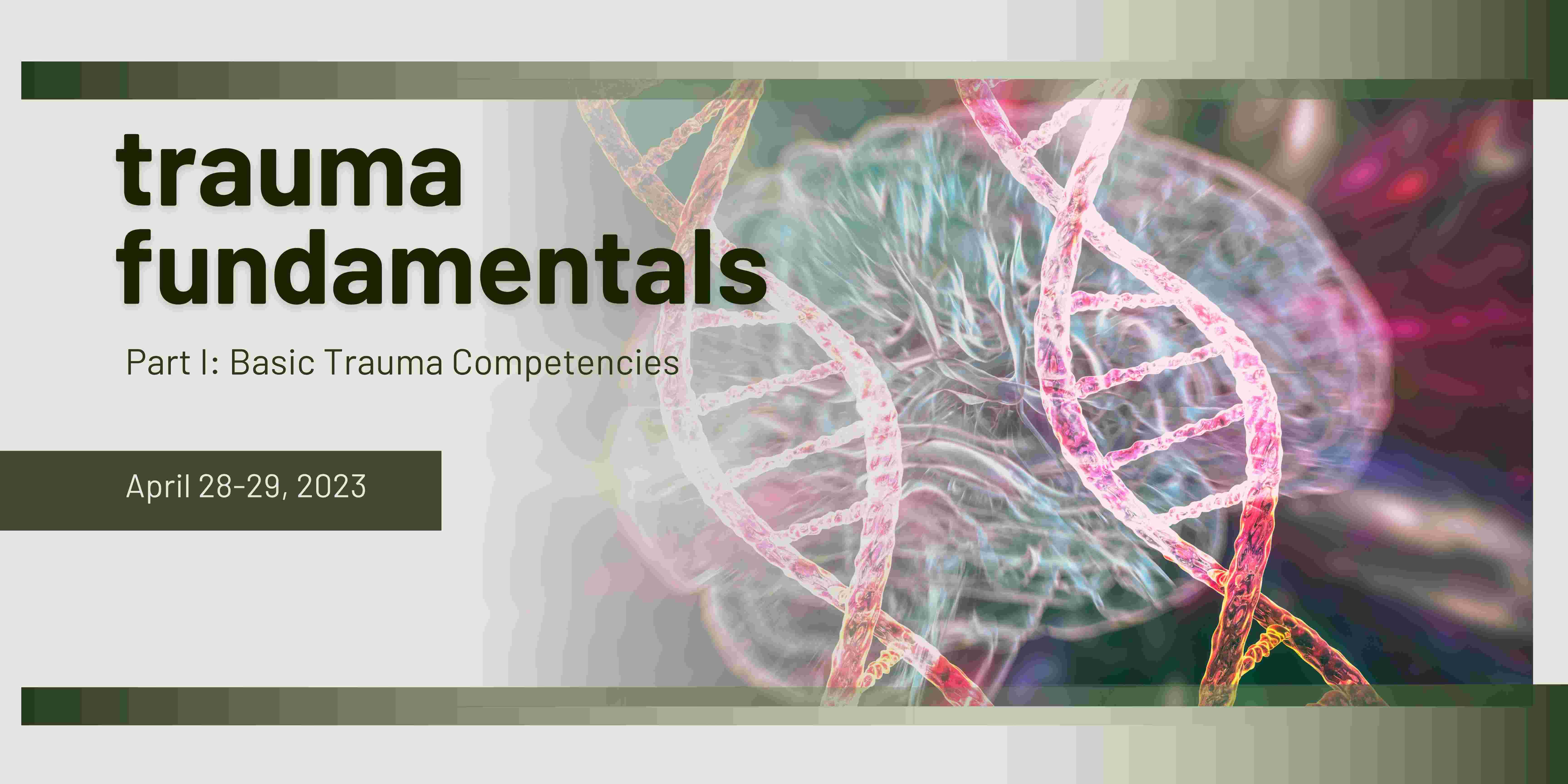
Trauma Fundamentals
Part I-Basic Competencies
Part I-Basic Competencies
Join us on April 28 & 29, 2023
Trauma is complex. Treating survivors of trauma is even more complex. Many clinicians feel under educated and under prepared to treat client's trauma. The trauma fundamentals-basic competencies training is part one of a two part training. The goal of the combined trainings is to provide attendees with a synthesis of ten fundamental trauma competencies. This training, Part 1 will focus on the first five of the ten competencies-the knowledge competencies.
To facilitate client's healing from traumatic experiences-it is essential that practitioners have a working knowledge of what trauma is, but even more crucial, a foundational understanding of what trauma does. This knowledge facilitates a foundational shift from viewing trauma from the perspective of what is "wrong" with our clients to an understanding of what happened to our clients.
KNOWLEDGE COMPENTENCES
1) An understanding of the etiology of trauma.
2) A working definition of trauma and posttraumatic stress.
3) A knowledge of normal and expected trauma reactions and responses in trauma survivors.
4) Knowledge of how trauma impacts the body, the brain, and the nervous system.
5) Knowledge of the trauma survivors disorganized system.
WHY TAKE THIS TRAINING?
1) Gain a foundational knowledge of trauma that will support the use of trauma informed modalities.
2) Increase confidence treating post traumatic stress.
3) Improve positive outcomes for your clients by treating trauma effectively.
4) Reduce burnout, compassion fatigue, and countertransference.
5) Move clients beyond coping skills and symptom management and into healing and wellness.
To facilitate client's healing from traumatic experiences-it is essential that practitioners have a working knowledge of what trauma is, but even more crucial, a foundational understanding of what trauma does. This knowledge facilitates a foundational shift from viewing trauma from the perspective of what is "wrong" with our clients to an understanding of what happened to our clients.
KNOWLEDGE COMPENTENCES
1) An understanding of the etiology of trauma.
2) A working definition of trauma and posttraumatic stress.
3) A knowledge of normal and expected trauma reactions and responses in trauma survivors.
4) Knowledge of how trauma impacts the body, the brain, and the nervous system.
5) Knowledge of the trauma survivors disorganized system.
WHY TAKE THIS TRAINING?
1) Gain a foundational knowledge of trauma that will support the use of trauma informed modalities.
2) Increase confidence treating post traumatic stress.
3) Improve positive outcomes for your clients by treating trauma effectively.
4) Reduce burnout, compassion fatigue, and countertransference.
5) Move clients beyond coping skills and symptom management and into healing and wellness.
Location
Remedy Counseling
750 W. Ustick Rd. Ste 120 and Online
750 W. Ustick Rd. Ste 120 and Online
Date & Time
April 28, 2023
9:00 AM -5:30 PM
April 29, 2023
9:00 AM-5:30 PM
9:00 AM -5:30 PM
April 29, 2023
9:00 AM-5:30 PM
Course Content
DAY ONE
#1 An understanding of the etiology of trauma.
The biography and biology of trauma.
Conceptualizing trauma from a systemic perspective.
conceptualizeing trauma from a biopsychosocial perspective.
Trauma experienced in the greater cultural milieu of client experience.
#2 A working definition of trauma and posttraumatic stress.
Traumatic stress as defined by the DSM.
Trauma as Defined by Peter Levine, and other experts in the field of trauma.
Symptoms conceptualized as a normal and expected traumatic stress response-not as pathology or a label.
The sub-types of trauma: Simple, Complex, Generational, Developmental, Interpersonal.
#3 A knowledge of normal and expected trauma reactions and responses.
Biological bases oftrauma related reactions.
Cognitive bases of trauma related reactions.
Affective bases of trauma related reactions.
The biography and biology of trauma.
Conceptualizing trauma from a systemic perspective.
conceptualizeing trauma from a biopsychosocial perspective.
Trauma experienced in the greater cultural milieu of client experience.
#2 A working definition of trauma and posttraumatic stress.
Traumatic stress as defined by the DSM.
Trauma as Defined by Peter Levine, and other experts in the field of trauma.
Symptoms conceptualized as a normal and expected traumatic stress response-not as pathology or a label.
The sub-types of trauma: Simple, Complex, Generational, Developmental, Interpersonal.
#3 A knowledge of normal and expected trauma reactions and responses.
Biological bases oftrauma related reactions.
Cognitive bases of trauma related reactions.
Affective bases of trauma related reactions.
DAY TW0
#4 Knowledge of how trauma impacts the body, the brain, and the nervous system.
Impact of trauma on DNA, the immune system, and overall health.
Emotions are physical, electrical, and neurochemical reactions all of which are experienced in the body.
Parts of the brain engaged in the threat response, storage, and recall of traumatic activation.
The role of trauma on a young and developing brain.
The major parts of the brain involved in experiencing, recording, and responding to trauma.
Knowledge of how trauma engages the threat response system, and how to engage the threat recovery system
#5 Knowledge of the trauma survivors disorganized system.
Difficulty staying in the here and now.
Family rules, programming, negative cognitions, and self-esteem
Substance Use, Eating Disorders, and OCD as a trauma response.
Implicit and Explicit Memories (flashbacks, activation, triggers).
Rigid or chaotic stress responses.
The development and role of parts.
Disconnection from self.
Disconnection from others (interpersonal relationships).
Dissociation.
Impact of trauma on DNA, the immune system, and overall health.
Emotions are physical, electrical, and neurochemical reactions all of which are experienced in the body.
Parts of the brain engaged in the threat response, storage, and recall of traumatic activation.
The role of trauma on a young and developing brain.
The major parts of the brain involved in experiencing, recording, and responding to trauma.
Knowledge of how trauma engages the threat response system, and how to engage the threat recovery system
#5 Knowledge of the trauma survivors disorganized system.
Difficulty staying in the here and now.
Family rules, programming, negative cognitions, and self-esteem
Substance Use, Eating Disorders, and OCD as a trauma response.
Implicit and Explicit Memories (flashbacks, activation, triggers).
Rigid or chaotic stress responses.
The development and role of parts.
Disconnection from self.
Disconnection from others (interpersonal relationships).
Dissociation.
About Melanie

Melanie Twite is a Licensed Clinical Professional Counselor in the State of Idaho, a National Board-Certified Counselor, a Certified Clinical Trauma Professional, a Certified Brainspotting practitioner and Consultant, and a board-approved supervisor in the State of Idaho. She earned her Master of Arts in Marriage and Family Therapy from George Fox University in 2005. Following graduation she gained experience working in community mental health, service extending for a Psychologist, and as an adjunct instructor for George Fox and Northwest Nazarene Universities. Melanie opened her private practice, Remedy Counseling in Meridian, Idaho in 2011.
Melanie has extensive training in trauma specific topics and modalities; particularly, developmental trauma, complex trauma, and the far-reaching impact of generational trauma and how childhood trauma specifically impacts a person’s overall physical, mental, relational, occupational, and educational well-being. She has also studied the impact of trauma on our social and cultural undercurrents and on our ability to genuinely connect with others. Melanie is passionate about assisting clients in their healing journey by using modalities that reboot and rewire the brain and body. She is equally enthusiastic about working with other healers to expand their knowledge and competency treating trauma.
Melanie has extensive training in trauma specific topics and modalities; particularly, developmental trauma, complex trauma, and the far-reaching impact of generational trauma and how childhood trauma specifically impacts a person’s overall physical, mental, relational, occupational, and educational well-being. She has also studied the impact of trauma on our social and cultural undercurrents and on our ability to genuinely connect with others. Melanie is passionate about assisting clients in their healing journey by using modalities that reboot and rewire the brain and body. She is equally enthusiastic about working with other healers to expand their knowledge and competency treating trauma.
DAILY SCHEDULE
8:00 AM
Coffee, Continental Breakfast, and Check-In
9:00 AM
Instruction
10:30 AM
Break
12:00PM
Lunch-On Your Own
1:30pm
Instruction
3:00pm
Break
5:00pm
Questions
5:30pm
End of Day